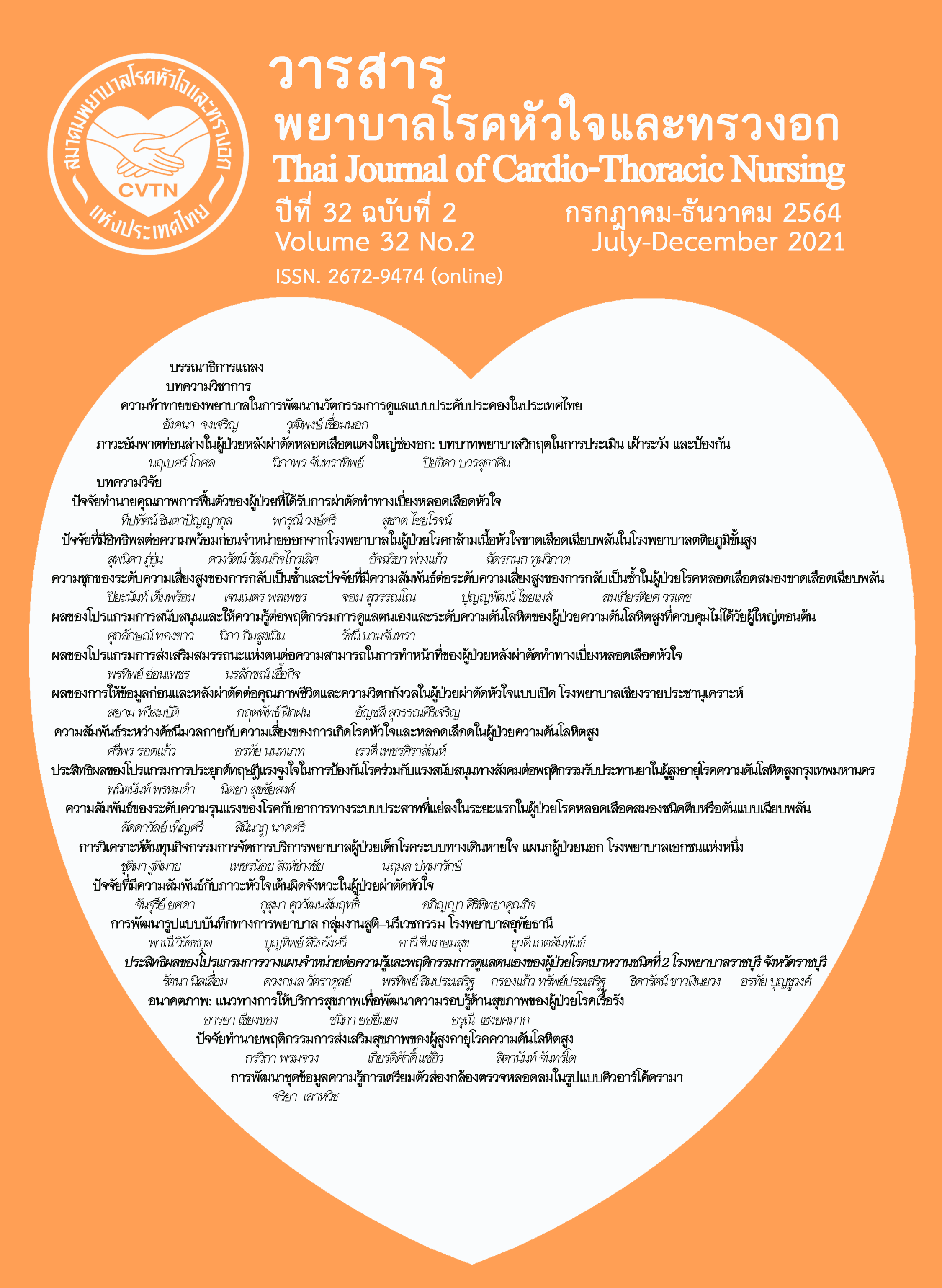ความท้าทายของพยาบาลในการพัฒนานวัตกรรม การดูแลแบบประคับประคองในประเทศไทย
คำสำคัญ:
ความท้าทายของพยาบาล, การพัฒนานวัตกรรม, นวัตกรรมการดูแลแบบประคับประคองบทคัดย่อ
การดูแลแบบประคับประคองเป็นการดูแลที่มุ่งเน้นการเพิ่มคุณภาพชีวิตของผู้ป่วยและครอบครัว ลดความทุกข์ทรมานทั้งด้านร่างกาย จิตใจ สังคมและจิตวิญญาณ โดยเฉพาะผู้ป่วยที่เจ็บป่วยในระยะท้ายของชีวิต การดูแลในระยะนี้ต้องคำนึงถึงความต้องการและความปรารถนาของผู้ป่วยและครอบครัวเป็นสำคัญ พยาบาลเป็นบุคลากรทีมสุขภาพที่ถูกคาดหวังจากผู้ป่วยและครอบครัวต่อการดูแลแบบประคับประคองมากที่สุด เนื่องจากเป็นผู้ที่อยู่ใกล้ชิดกับผู้ป่วย รับรู้ถึงปัญหาและมีบทบาทสำคัญในการช่วยเหลือ สนับสนุนและเสริมพลังอำนาจผู้ป่วยและครอบครัว ให้สามารถเผชิญและจัดการกับปัญหาต่างๆ ได้อย่างเหมาะสม
พยาบาลจึงต้องพยายามใช้ทั้งความรู้และประสบการณ์ รวมถึงการมีทักษะในการผลิต คิดค้นนวัตกรรมหรือสิ่งประดิษฐ์ใหม่ๆ เพื่อตอบสนองความต้องการการดูแลของผู้ป่วยและครอบครัวได้อย่างเหมาะสมและทันต่อการเปลี่ยนแปลงของสังคมในปัจจุบันที่มีข้อจำกัดในการอยู่ร่วมกันของมนุษย์จากโรคระบาดโควิด-19 เป็นความท้าทายของพยาบาลในการให้ความสำคัญในการสร้างนวัตกรรมการดูแลแบบประคับประคอง พยาบาลควรพัฒนานวัตกรรมปัญญาประดิษฐ์ (Artificial intelligence: AI) เพื่อนำมาใช้ประโยชน์ในการพยาบาลผู้ป่วยแบบประคับประคองในรูปแบบต่างๆ โดยเฉพาะการติดตามและตรวจสุขภาพทางไกล (Mobile health monitoring) เพื่อช่วยเพิ่มคุณภาพการดูแล
เอกสารอ้างอิง
Chewaskulyong B. Palliative care. Faculty of Medicine, Chiang Mai University. 3rd Edition. Chiang Mai; 2015.
World Health Organization. Palliative care. [document on the Internet]. The Institute; 2020 [updated 2021 August 29; cited 2020 Jun 5]. Available from: https://www.who.int/news-room/ fact -sheets/detail/palliative-care.
Singer AE, Goebel JR, Kim YS, Dy SM, Ahluwalia SC, Clifford M, et al. Populations and interventions for palliative and end-of-life care: a systematic Review. J. Palliat. Med. 2016; 19(9): 995-1008.
Thasaneesuwan S, Chuaytaen T, Tinkkaew P, Nilmanat K, Sae-chit K. Effects of a palliative care education program on palliative care competencies of registered nurses in a community hospital in Southern Thailand. Songklanagarind Journal of Nursing. 2020; 40(2): 122-32. (in Thai).
Krongyuth P, Campbell LC, Silpasuwan P. Palliative care in Thailand. Int J Palliat Nurs. 2014; 20(12): 600-607.
Yongsawang S, Sinprasert T, Techarat. The palliative care model development for end of life patients, Phatharam Hospital, Ratchaburi Province. Region 4-5 Medical Journal. 2015; 34(3): 236-247. (in Thai).
Preechakoon B, Molek R, Chuwongin D. Nursing in Data Technolgy Era. J. Chulabhorn Royal Academy. 2020; 3(1): 19-39. (in Thai).
Porta-Sales J, Noble S. Haematology and palliative care: The needs are out there. Palliat. Med. 2019; 33(5): 481-82.
Tanyaratsrisakul B. Health research and innovation. Journal of Health Research and Innovation. 2018; 1(1): 58-64. (in Thai).
Hormniam N. Health care innovative leadership in the nursing profession. Udonthani Hospital Medical Journal. 2020; 28(2), 244-53. (in Thai).
Pokpalagon P. Palliative care model in Thailand. Nursing Journal of the Ministry of Public Health. 2560; 26(3), 41-51. (in Thai).
Prapakorn S, Suayping S, Punaram W, Sookkhung A, Foongfaung S. Development of palliative nursing service system for cancer patients receiving treatment at National Cancer Institute. Journal of Nursing Division. 2015; 42(3), 50-68. (in Thai).
Pleumjai T. Management model for nursing service quality developing of palliative care in Songkhla Hospital. Journal of Prachomklao College of Nursing. 2020; 3(1), 73 - 94. (in Thai).
Polsavat B. Meenongwah J, Phultong S, Wiboonwipa C. Development of a seamless network system for the care of end of life patients in a Subdistrict Health Promotion Hospital. Journal of Health Science. 2017; 26(25), 908-13. (in Thai).
Kitreerawutiwong, N., Mekrungrongwong, S., Keeratisiroj, O., & Hangsuntea, J. Palliative Care in District Health System. Journal of Nursing and Health Sciences. 2018, 12(1S), 1-12. (in Thai).
Junda T, Phengjard J, Sumdangrit B, Patumwan A, Chaiviboontham S, Intarasombat P, et al. Palliative care system: Central region of Thailand. Thai Red Cross Nursing Journal. 2017; 10(2), 87-102. (in Thai).
Phatklay P, Kueasakul C. “Happy Hair Moblie” for hair shampooing of patient in Phangnga Hospital, Phangnga Province, Thailand. Journal of Health Science. 2017; 26(5), 875-82. (in Thai)
Putthipokin K. Correct dosage, safe patients, trust palliative dosage schedule. [document on the internet]. Bangkok; 2021 [updated 2021 August 23; cited 2021 Aug 23]. Available from: https://www. rama.mahidol.ac.th/km/qc/cqi/6301088
Sawasdeenarunat V, Taneerat A, Wisettharn T. The development of palliative care model for terminal cancer patients at Maharaj Nakhon Si Thammarat Hospital. Nursing Journal of the Ministry of Public Health. 2015; 25(1), 144-56. (in Thai).
Tasprasit T, Phimdee P, Mongkolchai S, Jullapan P, Puttatum Y. The development of the palliative care system for end of life patients at Udonthani Hospital. Nursing Journal of the Ministry of Public Health. 2015; 23(10), 80-90. (in Thai).
Public Health Nursing Division, Department of Health. “Innovative referral system for continuing nursing at home”. Best Practice, Bangkok's Service Quality Award, Fiscal Year. Nonthaburi: Department of Health; 2017.
Yanchumratkul K. The bath tent for bedridden patients. 4th Service Plan Sharing 2017: Road to Service Plan 4.0. Nonthaburi: Department of Health; 2017. (in Thai).
Nilmanat K. Palliative care in Thailand: development and challenges. Canadian Oncol Nurs J. 2016; 26(3): 262-64.
Lai L, Sato R, Onchi K, Landman AB, Zhang HM. Digital health innovation to integrate palliative care during the COVID-19 pandemic. Am J Emerg Med. 2021 Aug; 46: 664–666. doi: 10.1016/j.ajem.2020.08.008. Epub 2020 Aug 19. PMID: 33046309; PMCID: PMC7437574.
Chareonwongsak K. Creative thinking. Bangkok: Success Media; 2008.p.36.
Thongsai S. Nurse and the development of creative thinking. Journal of Phrapokklao Nursing College, Chanthaburi Province. 2015; 27(1): 1-12. (in Thai).
Bandansin J. Develop the creativity toward the nursing service innovation. Journal of the Royal Thai Army Nurses. 2014; 15(3): 9-17. (in Thai).
Khungtumneam K. Nursing service innovation. Journal of Phrapokklao Nursing College, Chanthaburi Province. 2011; 22(2): 71-79. (in Thai).
Phokhwang-Just W. Palliative care: a case study of Albert Ludwigs University Hospital, Freiburg, Germany. The Southern College Network Journal of Nursing and Public Health. 2017; 4 (in Thai).
Buajaroen H. Nurses’ role in innovative development for the holistic management of metabolic syndrome. Journal of Phrapokklao Nursing College, Chanthaburi Province. 2012; 23(1). (in Thai).
Klunklin A, Wichaikhum O, Kunaviktikul Wipada, Jaiwilai W. Nurses’ role on developing health promotion innovation in Northern. Nursing Journal, 2015; 42. (Special Issue). (in Thai).
Gensini GF, Alderighi C, Rasoini R, Mazzanti M, Casolo G. Value of telemonitoring and telemedicine in heart failure management. Card Fail Rev, 2017; 3(2): 116-121.
Kitsiou S, Paré G, Jaana M. Effects of home telemonitoring interventions on patients with chronic heart failure: an overview of systematic reviews. J Med Internet Res. 2015 Mar 12;17(3):e63. doi: 10.2196 /jmir.4174. PMID: 25768664; PMCID: PMC 4376138.
ดาวน์โหลด
เผยแพร่แล้ว
รูปแบบการอ้างอิง
ฉบับ
ประเภทบทความ
สัญญาอนุญาต
ลิขสิทธิ์ (c) 2022 วารสารพยาบาลโรคหัวใจและทรวงอก

อนุญาตภายใต้เงื่อนไข Creative Commons Attribution-NonCommercial-NoDerivatives 4.0 International License.
บทความนี้ยังไม่เคยตีพิมพ์หรืออยู่ในระหว่างส่งไปตีพิมพ์ในวารสารอื่น ๆ มาก่อน และกองบรรณาธิการขอสงวนสิทธิ์ในการตรวจทาน และแก้ไขต้นฉบับตามเกณฑ์ของวารสาร ในกรณีที่เรื่องของท่านได้ได้รับการตีพิมพ์ในวารสารฉบับนี้ถือว่าเป็น ลิขสิทธิ์ของวารสารพยาบาลโรคหัวใจและทรวงอก






